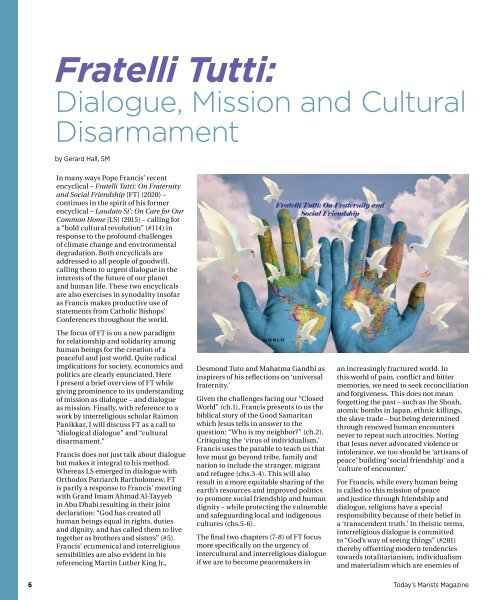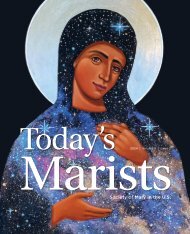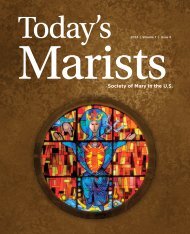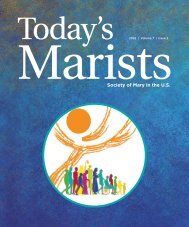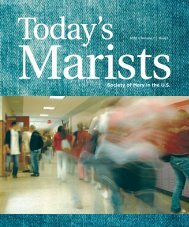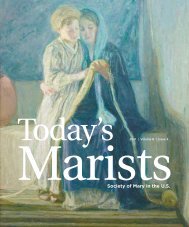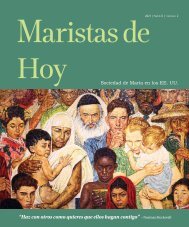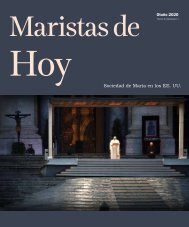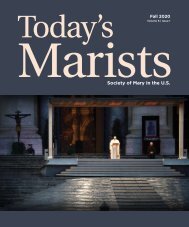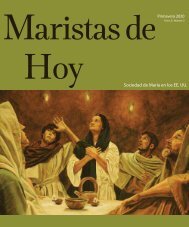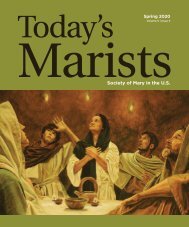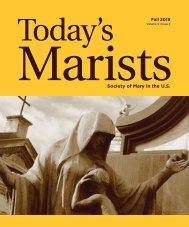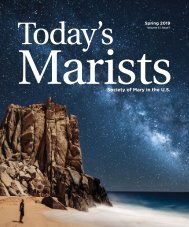Today's Marists Volume 6, Issue 2
- No tags were found...
You also want an ePaper? Increase the reach of your titles
YUMPU automatically turns print PDFs into web optimized ePapers that Google loves.
Fratelli Tutti:<br />
Dialogue, Mission and Cultural<br />
Disarmament<br />
by Gerard Hall, SM<br />
In many ways Pope Francis’ recent<br />
encyclical – Fratelli Tutti: On Fraternity<br />
and Social Friendship [FT] (2020) –<br />
continues in the spirit of his former<br />
encyclical – Laudato Si’: On Care for Our<br />
Common Home [LS] (2015) – calling for<br />
a “bold cultural revolution” (#114) in<br />
response to the profound challenges<br />
of climate change and environmental<br />
degradation. Both encyclicals are<br />
addressed to all people of goodwill,<br />
calling them to urgent dialogue in the<br />
interests of the future of our planet<br />
and human life. These two encyclicals<br />
are also exercises in synodality insofar<br />
as Francis makes productive use of<br />
statements from Catholic Bishops’<br />
Conferences throughout the world.<br />
The focus of FT is on a new paradigm<br />
for relationship and solidarity among<br />
human beings for the creation of a<br />
peaceful and just world. Quite radical<br />
implications for society, economics and<br />
politics are clearly enunciated. Here<br />
I present a brief overview of FT while<br />
giving prominence to its understanding<br />
of mission as dialogue – and dialogue<br />
as mission. Finally, with reference to a<br />
work by interreligious scholar Raimon<br />
Panikkar, I will discuss FT as a call to<br />
“dialogical dialogue” and “cultural<br />
disarmament.”<br />
Francis does not just talk about dialogue<br />
but makes it integral to his method.<br />
Whereas LS emerged in dialogue with<br />
Orthodox Patriarch Bartholomew, FT<br />
is partly a response to Francis’ meeting<br />
with Grand Imam Ahmad Al-Tayyeb<br />
in Abu Dhabi resulting in their joint<br />
declaration: “God has created all<br />
human beings equal in rights, duties<br />
and dignity, and has called them to live<br />
together as brothers and sisters” (#5).<br />
Francis’ ecumenical and interreligious<br />
sensibilities are also evident in his<br />
referencing Martin Luther King Jr.,<br />
Desmond Tutu and Mahatma Gandhi as<br />
inspirers of his reflections on ‘universal<br />
fraternity.’<br />
Given the challenges facing our “Closed<br />
World” (ch.1), Francis presents to us the<br />
biblical story of the Good Samaritan<br />
which Jesus tells in answer to the<br />
question: “Who is my neighbor?” (ch.2).<br />
Critiquing the ‘virus of individualism,’<br />
Francis uses the parable to teach us that<br />
love must go beyond tribe, family and<br />
nation to include the stranger, migrant<br />
and refugee (chs.3-4). This will also<br />
result in a more equitable sharing of the<br />
earth’s resources and improved politics<br />
to promote social friendship and human<br />
dignity – while protecting the vulnerable<br />
and safeguarding local and indigenous<br />
cultures (chs.5-6).<br />
The final two chapters (7-8) of FT focus<br />
more specifically on the urgency of<br />
intercultural and interreligious dialogue<br />
if we are to become peacemakers in<br />
an increasingly fractured world. In<br />
this world of pain, conflict and bitter<br />
memories, we need to seek reconciliation<br />
and forgiveness. This does not mean<br />
forgetting the past – such as the Shoah,<br />
atomic bombs in Japan, ethnic killings,<br />
the slave trade – but being determined<br />
through renewed human encounters<br />
never to repeat such atrocities. Noting<br />
that Jesus never advocated violence or<br />
intolerance, we too should be ‘artisans of<br />
peace’ building ‘social friendship’ and a<br />
‘culture of encounter.’<br />
For Francis, while every human being<br />
is called to this mission of peace<br />
and justice through friendship and<br />
dialogue, religions have a special<br />
responsibility because of their belief in<br />
a ‘transcendent truth.’ In theistic terms,<br />
interreligious dialogue is committed<br />
to “God’s way of seeing things” (#281)<br />
thereby offsetting modern tendencies<br />
towards totalitarianism, individualism<br />
and materialism which are enemies of<br />
6 Today’s <strong>Marists</strong> Magazine


